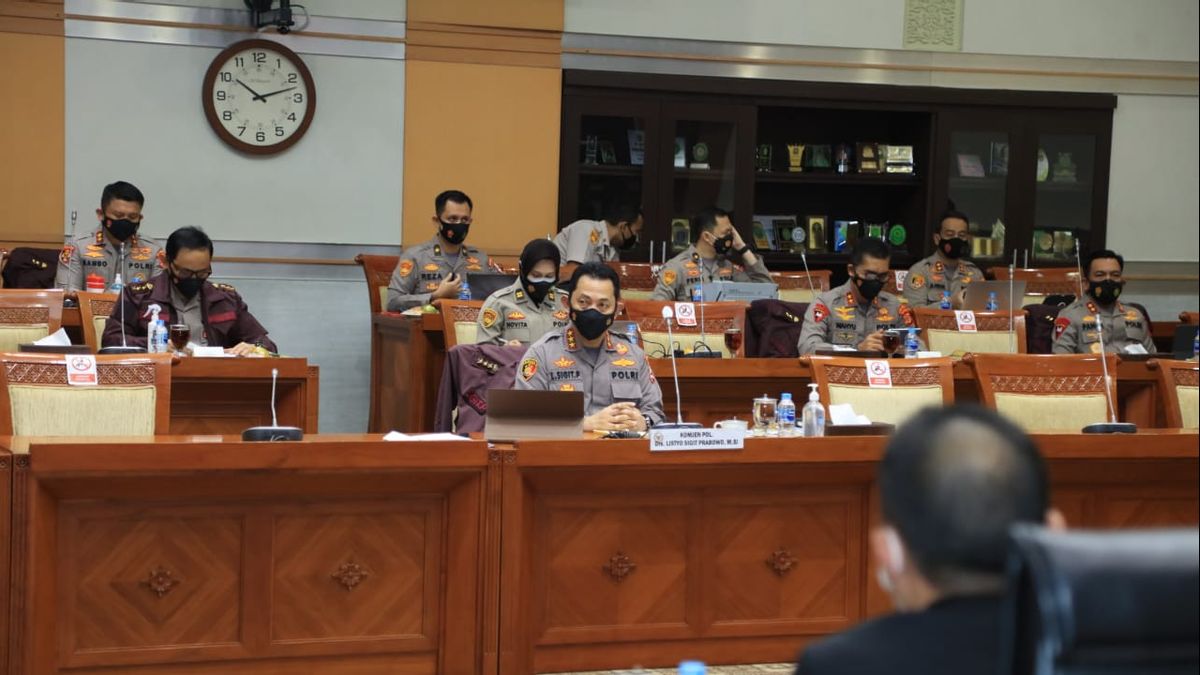JAKARTA - Kabareskrim Komjen Listyo Sigit Prabowo has been approved by the Indonesian Parliament to become the new National Police Chief to replace General Idham Azis who will retire. He brought up a number of concepts that would be applied in the Police, one of which was the virtual police, which was then questioned for its urgency.
The hammering of the Chairman of the Indonesian House of Representatives Puan Maharani and the applause of the members of the DPR RI who attended the plenary session on Thursday, January 21, marked the approval of Komjen Listyo Sigit as the new National Police Chief to replace Idham Azis. This decision was made after Deputy Chairman of Commission III of the DPR RI, Ahmad Sahroni, read out the results of the fit and proper test that had been carried out the day before, Wednesday, January 20.
In this fit and proper test, Listyo did get praise because his paper was considered so comprehensive. In fact, he was called a candidate for the millennial National Police Chief because in his presentation he alluded to the concept of technological reform in the Bhayangkara Corps to a digital approach, one of which was carried out through the virtual police.
In contrast to the cyber police, which provides punishment, the virtual police that Listyo will present will be tasked with providing education to citizens or the public in general. The implementation of this program will later collaborate with influencers.
"With virtual police, it is more aimed at educational matters, learning involves the community, involving influencers who have quite a number of followers," said Listyo during a fit and proper test before Commission III of the DPR RI.
Later, this virtual police will teach netizens how good ethics and culture are in the use of social media. This also optimizes cyber campaigns.
Rifqi Rachman, researcher of The Indonesian Institute Center for Public Policy Research, highlighted the virtual police concept. According to him, the virtual police approach through education that is different from cyber police cannot be a solution to improve the ethics of netizens on social media, so he questions the urgency.
"This raises further questions about the urgency of forming a virtual police. Because, when the approach through cyber police is unable to enter the ethical realm in the digital space, the formation of a virtual police with an educational approach in fact cannot be an immediate answer," Rifqi said in his statement quoted by VOI. , Friday, 22 January.
Moreover, currently surveillance or surveillance in digital space carried out by the police team is currently a worrying phenomenon. So, this researcher assesses that cyber police and virtual police are very likely to narrow down the freedom of citizens, especially in the digital space.
Furthermore, Rifqi also questioned the scope of education that this virtual police could provide. This is because there is no definite indicator regarding the concept of culture and good ethics in Listyo's presentation.
"To what extent is the scope of education that can be provided by them (virtual police, red)? This will certainly be very difficult to implement because the concept of good culture and ethics used as the standard of social media in the Chief of Police's presentation does not have clear indicators," he said.
"If the National Police does not immediately clarify this rule, the implementation conditions that are prone to irregularities will be increasingly difficult to avoid," he added.
Rifqi also assessed that the virtual police cannot rely solely on influencers to bring cultural and ethical values. Because this will have a detrimental impact on netizens as a whole, such as dominating conversations between virtual police and influencers, which makes this one-command narrative difficult to match and ultimately erodes the digital space.
In addition, the capacity of influencers is also thought to make this cyber campaign end up negative. This has even happened when the government intensively invites social media activists with hundreds of thousands to millions of followers to campaign for the Omnibus Law on Employment Creation.
"So, in brief, the existence of an ethics supervisor for internet users in the form of virtual police is not an urgent need. Strengthening Ditpidsiber (Directorate of Cyber Crime) is actually a more realistic and appropriate alternative if the National Police's goal is to provide security to internet users at home. Indonesia from the action of computer crime and computer related crime, "he said.
This virtual police is nothing new in cyberspace. Several countries have implemented it first and each country has different ways and methods of realizing virtual police.
Meanwhile in Indonesia, only Tulungagung has implemented this program. So, to enrich the picture, the VOI team gathered from various sources how virtual police from other countries were.
Virtual Beijing Police - ChinaChina launched the Virtual Beijing Police program in 2007. Like the officers on duty at the police station, officers will be on standby during their working hours on the official Beijing police website to receive complaints from the public.
Netizens can simply press the cartoon images of the two policemen that appear on the website if they want to report malicious information or pornographic sites. After that, netizens will be asked to fill out a form with the data needed so that the report can be processed.
"Later, the officer will contact the contact that has been included within 30 minutes after the report is made," said Zhao Hongzhi, Head of the Beijing Police Internet Department, reported by China Daily, Wednesday, January 20.
Virtual Police Station - IndiaIn collaboration with the Commonwealth Human Rights Initiative (CHR (), the Rajasthan police have developed a Virtual Police Station (VPS), which allows the general public to “enter” virtually any police station.
The public can enter any available room in a 360 degree view. Later, the public can learn how the legal processes and procedures are carried out by officers every day.
In addition, users can more clearly observe the items available in the room. Examples include registration letters, evidence of crime, police equipment, telephones, and many more.
Due to this loss, the Indian government has implemented Virtual Police Stations in several provinces. Among others, Odisha Province, Delhi, and Andhra University.
Virtual Police Station - Brampton, CanadaIn contrast to India, which implements VPS in the form of a website, the Brampton Police has chosen to use kiosks that are spread across several points.
Through these kiosks, the public has direct access to the police complaint number, which is 24-7. Later, the public can report various things they have seen or experienced-starting from property damage, complaints against motorists, cases of loss.
Launched last November, Virtual Police Station is a program of the Chief of Peel, Brampton Police, Nishan Duraiappah. According to him, virtual stations are a way to embrace technological innovation under his leadership.
Tulungagung Virtual PoliceBefore Komjen Listyo Sigit Prabowo presented his ideas in a fit and proper test, the Tulungagung Police had already launched a virtual police. Named Pos Digital Astuti, this service connects the public with the police without having to meet face to face.
To get information related to the police, the public simply needs to use a digital post which is located in a row of ATM machines at Golden Swalayan Tulungagung. By pressing the available button, the user will be automatically connected via video call with the duty officer.
"This is the first in Indonesia, the public can directly connect with our officers via video calls, and ask what information is needed," said Head of Tulungagung Police, AKBP Eva Guna Pandia as reported by Nusa Daily.
The English, Chinese, Japanese, Arabic, and French versions are automatically generated by the AI. So there may still be inaccuracies in translating, please always see Indonesian as our main language. (system supported by DigitalSiber.id)













